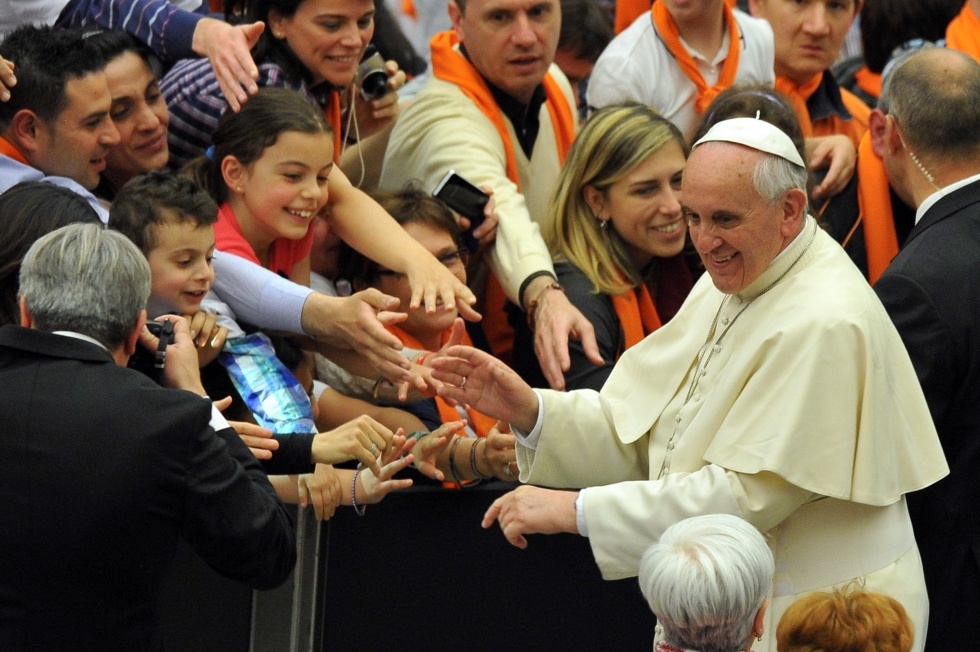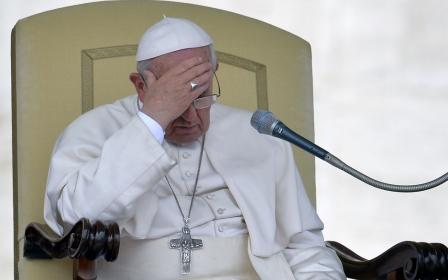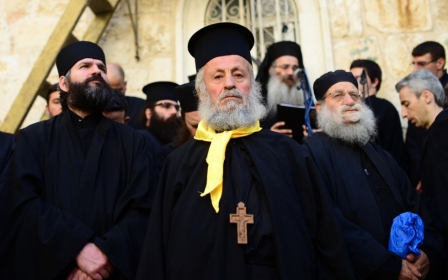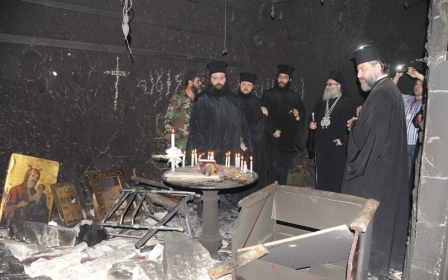Volatile Holy Land heightens security for papal visit

JERUSALEM - The upcoming pilgrimage to the Holy Land by Pope Francis, best known as the people's pope, is likely to prove a major headache for local security forces tasked with his security.
The pontiff's first stop will be Jordan, where he arrives on Saturday.
Early the following day, he leaves for the West Bank town of Bethlehem, then flies to Israel where he will stay until the evening of May 26.
Exacerbating the challenges of securing the head of the world's 1.2 billion Roman Catholics in a region that is a hotbed of religious extremism is this pope's constant desire to engage with followers, which has caused consternation among his security detail in the past.
This time, the pope will travel twice in open-top cars -- first in the Jordanian capital Amman and again in Bethlehem.
New MEE newsletter: Jerusalem Dispatch
Sign up to get the latest insights and analysis on Israel-Palestine, alongside Turkey Unpacked and other MEE newsletters
"This pope is a big problem for security," said Father David Neuhaus, who represents Hebrew-speaking Catholics in Israel, recalling how, on his first day as pope, Francis broke away from his guards to mingle with people.
"He'll do his best to be a very heartwarming and joyful problem here as well," Neuhaus told reporters in Jerusalem earlier this week.
For Jordan, the aim is to show the pope that the Hashemite kingdom is "an oasis of peace and stability" in the strife-torn Middle East, a security official said, referring predominantly to the conflict raging in neighbouring Syria.
"It is a very important visit for Jordan, especially with all the unrest happening around us," he told AFP.
"It is the fourth visit by a pope to Jordan since 1964 and the first for Pope Francis and we are doing our best to cope with this big responsibility," he said.
Another security source said "there will be more than 500 security personnel, beside the Royal Guards, and of course security cameras".
On his arrival, Francis will meet King Abdullah II, then celebrate mass at a sports stadium in the capital that will be attended by tens of thousands of people.
There, he will take a turn in an open-top car.
For the most part, the pope will be shuttled between his three stops by helicopter, flying from Amman to Bethlehem, then to Tel Aviv airport, although he will then travel to Jerusalem by car.
On arrival in Bethlehem early on May 25, the pope's movements will be secured by the Palestinian police and presidential guard.
Although the Palestinian security services refused to be drawn on numbers, spokesman Adnan Damiri told AFP there would be "more than enough".
Among those tasked with protecting the pontiff is a group of young women from the Palestinian presidential guard who have recently undergone training by French special forces.
When he reaches Jerusalem in the late afternoon, after an official welcome ceremony at Ben Gurion airport near Tel Aviv, thousands of police will be deployed in and around the city, among them special and undercover units, police spokesman Micky Rosenfeld told AFP.
Police helicopter units will also be operating, he said.
No reports of threats
In the Old City, where Francis is to meet Ecumenical Orthodox Patriarch of Constantinople Bartholomew I and visit key Christian, Jewish and Muslim sites, there are 320 security cameras, Rosenfeld said.
Among sites he will visit is the flashpoint Al-Aqsa mosque compound. It is considered to be Islam's third holiest site and venerated by Jews as the site where King Herod's temple stood.
He will also visit the Western Wall, the holiest site at which Jews can pray.
The pope will spend the night in the Latin Patriarchate, which is also located just inside the Old City walls.
Rosenfeld said the police were coordinating with Israel's Shin Bet internal security agency, as well as with Italian security accompanying the pope.
Israeli police have heightened security around Christian sites in recent weeks following a wave of hate crimes by extremist Jews, but Rosenfeld said there were no concrete warnings of any specific threat against the pope.
Despite the tight security expected, there will still be the "possibility for this spontaneous connection with the people" that is so typical of the Argentinian pope, Neuhaus said.
"I am quite certain that these moments will be powerful images that will fill the hearts and minds of the faithful and those observing," he said.
Middle East Eye delivers independent and unrivalled coverage and analysis of the Middle East, North Africa and beyond. To learn more about republishing this content and the associated fees, please fill out this form. More about MEE can be found here.




